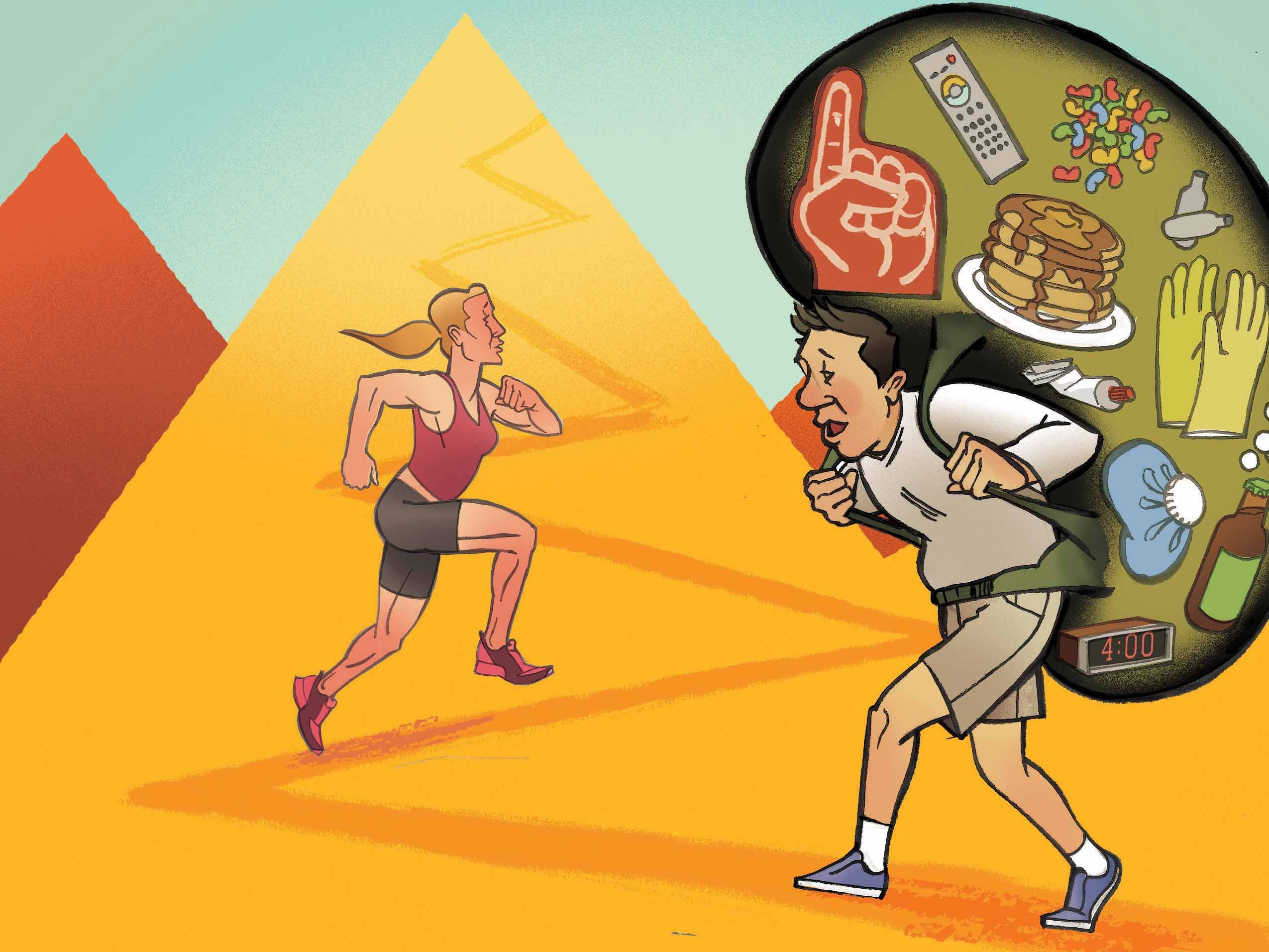How To Support Your Triathlete

Illustration by Hunter King.
Being a triathlete requires a whole lot of extra help. Here are some valuable tips for your support crew.
It’s early in the year. Winter is winding down and a new triathlon season is nearly upon us. We’re refreshed from the off-season, our zeal renewed for our beloved sport. In fact, we’re so raring to go mentally and physically, we’re surely headed for our best race seasons ever. Power will rise and PR’s will fall—we shall be unstoppable!
In order to tick every box of triathlon preparedness, though, we also need to ensure that our support systems are securely in place. It takes a village to raise a successful triathlete, and that village needs training, too. It’s not as simple as strapping on a foam finger and cheering like a freak on race day, fueled by a few tailgate beers. You’ll have to clue them in before they can correctly interpret your cries for help, both subtle and straightforward, before, during and after races.
RELATED – Confessions Of An Age-Grouper: A Perfect Match
So whether you send this article to your loved ones or leave the magazine slyly propped open on your spouse’s nightstand, make sure your team reads and absorbs the tips herein.
Throughout the season there are a number of ways in which a supporter can enhance a triathlete’s efforts.
Early on, try to muster the question, “Are you racing pro this year?” with a straight face. However small the sea of your triathlon community, make your triathlete feel like a really big fish.
Avoid comments like, “Is it supposed to fit that tight?” no matter how unaccustomed you are to viewing a man encased sausage-like in Lycra, or, “Wow, you really eat a lot!” despite the fact that your triathlete girlfriend just chowed down two entrées.
Keep a vigilant eye out for over-training-induced meltdowns. Is your triathlete unusually cranky or emotional, reduced to tears when comparing past performances in her Training Peaks log? Does he snap at the slightest thing, such as running out of protein powder or forgetting to charge his Garmin? First address his current crisis, then ever so gently suggest a day off.
Do not smirk, no matter what combination of compression gear your triathlete insists on wearing around the house, around town or even to bed. Sexy lingerie is hardly a steppingstone to athletic stardom.
RELATED: The Role Of “IronSherpa”
Race week and race day require an even greater level of finesse from a triathlon supporter.
Be prepared to run a plethora of last-minute errands. “Gluten-free flaxseed-infused pineapple ginger pancakes? Sure. I’ll pick them up right after I track down those CO2 cartridges, salt tablets, Body Glide and gummy worms. Anything else while I’m out?”
Twenty-four to 48 hours before any race, your athlete will morph into a zombie. Prop his feet up, hand him the TV remote and a sippy cup of sports drink and leave him be. But don’t stray too far—he may not want to speak to you, but he needs to know you’re near.
Rehearse saying this with a smile: “Of course I’ll get up at 4 a.m., schlepp you and all your stuff to the start. Nowhere I’d rather be. Especially not snuggled warmly in bed.”
During the actual race, be where you say you’ll be. No matter how often your triathlete insists that she’s totally “in the zone” on course, barely able to pick particular faces or voices out of the crowd, I guarantee she’s looking for you. Be loud and proud (heck, get a foam finger if you have to)—she’ll appreciate the boost.
RELATED – Triathlete Love: A Thousand Words
Your first step post-race is to attend to your athlete’s immediate needs. He may as well be an infant, unable to communicate clearly for at least an hour. He might spit up. Your job is to interpret his grunts and groans and longing looks. Is his hand outstretched? Fill it with a bottle of water (better yet, a bottle of beer). Is she rubbing her glutes or wincing when she walks? Get her to the massage tent or strap on an ice bag, stat!
When your athlete’s communication skills return, pull up a chair and prepare to listen. For a long time. Feign fascination for every detail of the battering swim start, the bike course bottle handoffs, the pit stops. You had GI distress? Tell me more!
Steel yourself for sorting through your athlete’s gear—as any devoted helper would do. This includes smelly, sweaty, salt-caked clothing and sticky everything. Don rubber gloves if you have to, but dive right in and conquer that collection of nastiness.
Prepare also for the post-race roller coaster of emotions your athlete will no doubt ride. Regardless of whether he won his age group or ended up walking every mile, the event of a lifetime is over. Done. Dusted. And the aftermath of months of singular focus and preparation is often a post-partum-like plummet into depression. That is, until she registers for her next race and once again drafts you as her No. 1 fan.
As the athlete, don’t forget to reward your crew for their hard work. Wine, spa treatments or sparkly things will do. After all, you may have swum, biked and run an ungodly number of miles, but they suffered through every stroke and stride as well, and are likely just as weary—minus the finisher’s medal and lifetime bragging rights.
RELATED – Ask A Pro: Race Sherpa For A Day
Read Holly Bennett’s “Dispatch” column every Thursday on Triathlete.com.